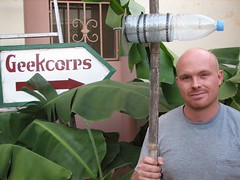The permanent Beta?
 Browsing through some old posts in the always worthwhile Creating Passionate Users blog, I came across this interesting post from last March: Ultra-fast release cycles and the new plane. The post is about the growing popularity of extremely short turn arounds between versions that has become characteristic of web2.0-type development - what O'Reilly called the permanent beta. This is an issue we discuss in our office quite a bit. Browsing through some old posts in the always worthwhile Creating Passionate Users blog, I came across this interesting post from last March: Ultra-fast release cycles and the new plane. The post is about the growing popularity of extremely short turn arounds between versions that has become characteristic of web2.0-type development - what O'Reilly called the permanent beta. This is an issue we discuss in our office quite a bit.We have some users who demand rapid release. They feel that if they find a small bug on Monday, dream up a new piece of functionality they'd like on Wednesday, and want the menus reorganized on Friday, they should certainly be allowed three versions that week. After all, they're paying. What about the increased risk of defects? Well, they don't mind... they'll report them and they will be fixed in the next rapid release. On the other hand, we have users who despise the rapid release. These clients expect us to organize their requests, implement them all, test them all, and give them an upgrade once or twice a year at most. Installing any more often, they've told us, complicates user training and increases the risk that a new release will break something that was already working. Far from demanding rapid release, they see it as a lack of professionalism. How do we understand this difference? In the Creating Passionate Users piece, Kathy Sierra talks about the short-release trend as a "cultural" one. She's focusing on the youthful subscribers to the Myspace website, her model of the rapid release project. So she focuses on factors relating to youth culture. What she does not dwell on is that Myspace is fundementally different from business software - it is not critical to most users' bottom lines. Let's look at this "cultural" difference among the staff of non-profit organizations using our Members Only software. It seems to me the difference here hinges on the perception of real costs and real risks associated with installing a new version. These costs and risks actually differ significantly between organizations, so the evolution of different cultures around software installation is not at all irrational. It has to do with the organization's size (in number of users, and in number of locations) and the level of activity (How many transactions go through the software in an average day.) Large organization using software for mission critical purposes are aware of the costs of training and of the bottom-line impact of a significant defect, and therefore want to minimize the number of training and testing cycles they expose themselves to. Where does you organization fit on this spectrum? Are you happy to use a permanent beta? Are new features on a regular basis worth encountering bugs you will need to report? Are you the kind of user who is always pushing for the next update, or are you loathe to install them? What factors have shaped your attitudes? |











